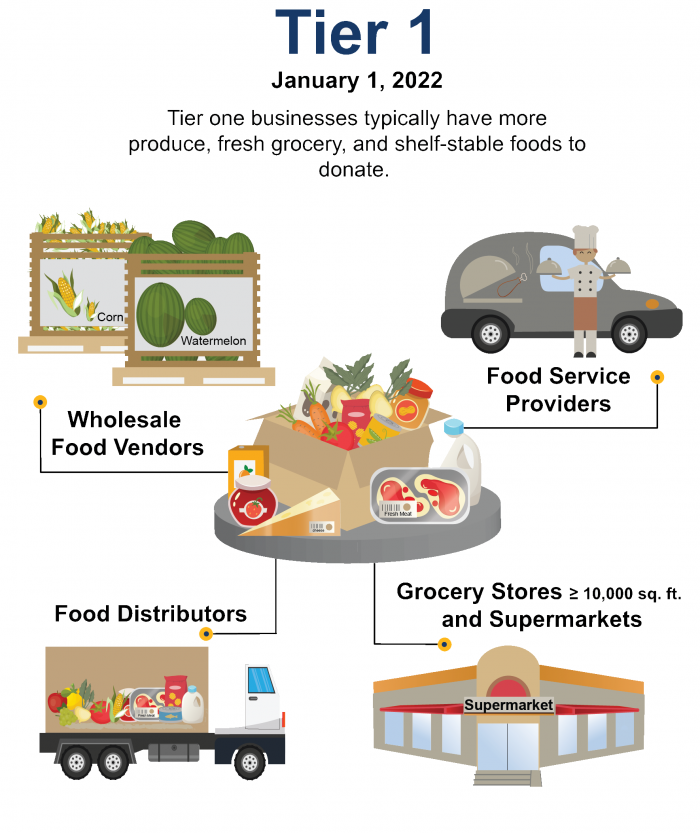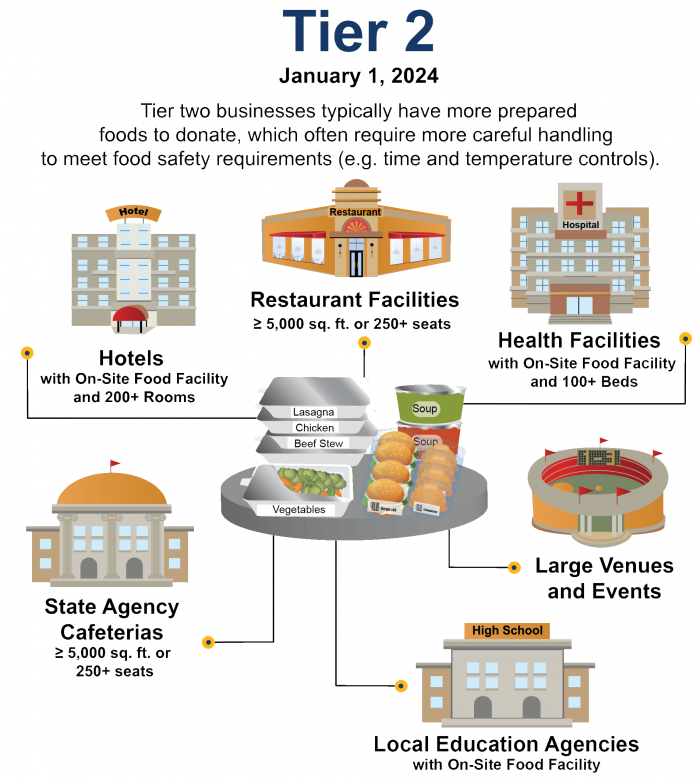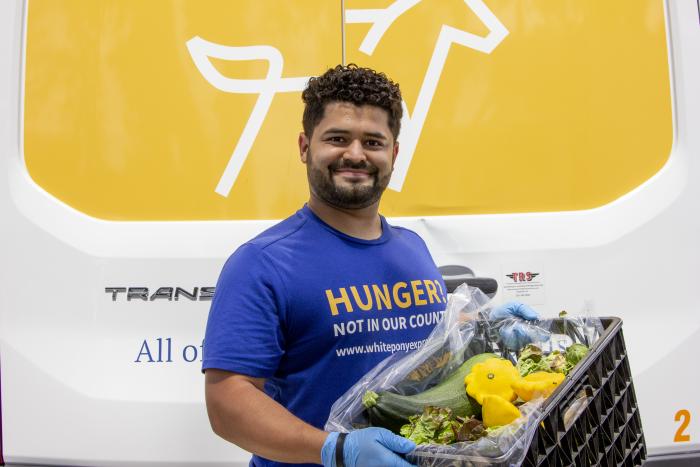Some requirements include:
- A contract or written agreement must be maintained with all Food Recovery Organizations that pick up or receive edible food.
- A record must be kept indicating all types of food being donated, pounds donated per month, frequency of donations, and the contact information of the contracted Food Recovery Organization(s).
- Generators shall not intentionally spoil food that can be recovered to feed people (and shall not compost edible food).
To determine if your food generating business is covered by SB 1383, see the definitions outlined below.
Tier One
Deadline for compliance: January 1, 2022
- Supermarkets: A full-line, self-service retail store with gross annual sales of two million dollars ($2,000,000), or more, and which sells a line of dry grocery, canned goods, or nonfood items and some perishable items.
- Grocery Stores: Grocery store with a total facility size equal to or greater than 10,000 square feet.
- Food Service Providers: An entity primarily engaged in providing food services to institutional, governmental, commercial, or industrial locations of others based on contractual arrangements with these types of organizations.
- Food Distributors: A company that distributes food to entities including, but not limited to, supermarkets and grocery stores.
- Wholesale Food Vendors: A business or establishment engaged in the merchant wholesale distribution of food, where food (including fruits and vegetables) is received, shipped, stored, and prepared for distribution to a retailer, warehouse, distributor, or other destination.
Tier Two
Deadline for compliance: January 1, 2024
- Restaurants: Restaurant with 250 or more seats, or a total facility size equal to or greater than 5,000 square feet.
- Hotels: Hotel with an on-site food facility and 200 or more rooms.
- Health Facilities: Health facility with an on-site food facility and 100 or more beds.
- Large Venues: Large venue means a permanent venue facility that annually seats or serves an average of more than 2,000 individuals within the grounds of the facility per day of operation.
- Large Events: Large events means an event, including, but not limited to, a sporting event, a flea market or a festival, that charges an admission price, or is operated by a local agency, and serves an average of more than 2,000 individuals per day of operation of the event, at a location that includes, but is not limited to, a public, nonprofit, or privately owned park, parking lot, golf course, street system, or other open space when being used for an event.
- State Agencies: A state agency with a cafeteria with 250 or more seats or a total cafeteria facility size equal to or greater than 5,000 square feet.
- Local Education Agencies: A local education agency with an on-site food facility. Local education agency means a school district, charter school, or county office of education that is not subject to the control of city or county regulations.
Donate food and feed people today.
Contra Costa County has developed a list of local Food Recovery Organizations and Services. Contact a vendor of your choice and start donating food today!
Click here to download the RecycleSmart Food Donation brochure (in partnership with Contra Costa Health Services).
Food Safety and Food Donation in Contra Costa County
The County Health Services Department has developed information and tools for businesses to safely donate extra food.
- Donating Food Safely in Contra Costa County
- Food Distribution Map
Laws Around Donating Food
Both Federal and State law provide liability protections for good faith food doners.
- California Good Samaritan Food Donation Act (AB 1219)
- Federal Bill Emerson Good Samaritan Food Donation Act
RecycleSmart Community Partnership with White Pony Express
RecycleSmart and White Pony Express (WPE), a Food Recovery Organization in Contra Costa County, were awarded a food recovery grant from the State of California (CalRecycle). White Pony Express provides free, as-needed food rescue services for Contra Costa County. WPE can dependably pick up and safely distribute surplus fresh and prepared food within 24 hours, supporting our highest-need neighbors: isolated seniors, students and their families, veterans and the unhoused. For more information about free food recovery services provided by White Pony Express visit the WPE website.
Inspection and Enforcement
Local jurisdictions are required to provide food recovery information and outreach to Commercial Edible Food Generators and inspect and enforce the food recovery requirements of SB 1383. A timeline is provided below to help your edible food generating business develop a food recovery program in compliance with state law.
RecycleSmart is partnering with Contra Costa Health Services to annually inspect covered food-generating businesses.
January 1, 2022 | Tier 1 Commercial Edible Food Generator Requirements and Annual Inspections Begin |
| |
January 1, 2024 | Tier 2 Commercial Edible Food Generator Requirements and Annual Inspections Begin Tier 1 and Tier 2 Enforcement Begins (penalties may be issued for non-compliance) |
RecycleSmart staff is available to help answer questions or provide support in your development of a successful food recovery program. Please email authority@recyclesmart.org for assistance.




